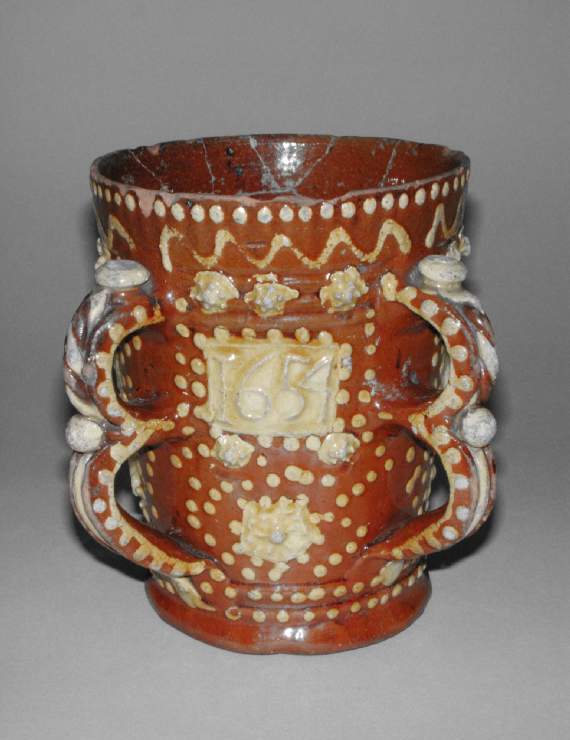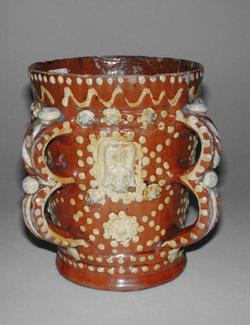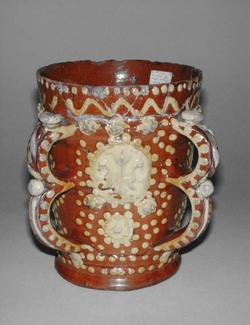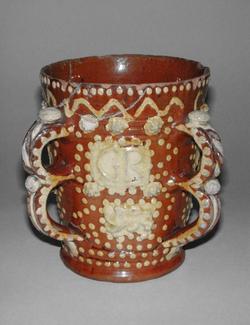Current Location: Gallery 27 (Glaisher)
Maker(s)
Production:
Richardson, George, potter
Entities
Categories
Notes
History note: Probably George Weare Braikenridge (1775-1856); his son, the Revd. George Weare Braikenridge ( ); William Jerdone Braikenridge (1816-1907); sold Christie's, 28 February, 1908, Braikenridge Collection of Medieval Works of Art, the property of W. Jerdone Braikenridge Esq. deceased late of Claremont, Clevedon, Somerset, lot 165; bought by Stoner for 37 guineas on behalf of Dr J.W.L. Glaisher, FRS, Trinity College, Cambridge.
Legal notes
Dr J. W. L. Glaisher Bequest
Measurements and weight
Height: 15.6 cm
Acquisition and important dates
Method of acquisition: Bequeathed
(1928-12-07)
by
Glaisher, J. W. L., Dr
Dating
17th Century, Mid
Commonwealth
Production date:
dated
AD 1654
Note
Drinking cups with more than one handle were the great speciality of Wrotham potters in the seventeenth century, and have been described as 'tygs' by collectors since the nineteenth century. They were made of red or brown clay decorated in white with slip-trailing moulded prunts, and heraldic motifs on applied pads of clay, which appear yellow under the lead glaze. Many of them bear dates and the potter's initials sometimes accompanied by or two other sets of initials presumably those of their owners. Twisted two-colour edges and white bun-shaped finials were features of the double-loop handles, usually, three or four (as here), but sometimes only two.
The initials GR on this example stand for George Richardson who signed pots between 1642 and 1677, and was the first recorded potter to put the place name WROTHAM on his work - on an undated jug probably made in the 1640s, and one dated 1656, both in the Fitzwilliam Museum ( C.116-1928, and C.130-1928). He lived in Plott (St Mary's Platt), a hamlet, which was the centre of the potting industry in the manor of Wrotham. His house, 'work house', and accompanying land belonged to Nicholas Myller, who mentioned Richardson's occupation of them in his will in 1653. Richardson made his will in June 1687, and the inventory taken after his death shows that he lived in comfortable circumstances and had combined his potting trade with farming in a small way (for details, see Documentation, Semple, 2008). His wife Mary, who had predeceased him a year earlier, was a member of the Hubble family of potters, and Richardson's son-in-law, Nicholas Hubble junior, was an executor of his will. A tyg by Nicholas Hubble senior dated 1654 is in the Fitzwilliam, (C.117-1928).
People, subjects and objects depicted
Components of the work
Surface
composed of
lead-glaze
Body
Materials used in production
red-brown and white
Earthenware
Inscription or legends present
- Text: GR
- Location: On side
- Method of creation: Stamped in relief on pad of clay
- Type: Initials
References and bibliographic entries
Related exhibitions
Identification numbers
Accession number: C.128-1928
Primary reference Number: 71724
Old object number: 2842
Stable URI
Audit data
Created: Saturday 6 August 2011
Updated: Tuesday 30 April 2024
Last processed: Tuesday 15 July 2025
Associated departments & institutions
Owner or interested party:
The Fitzwilliam Museum
Associated department:
Applied Arts







